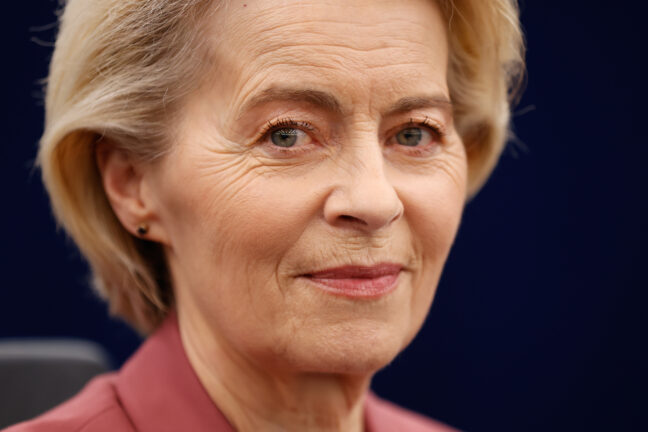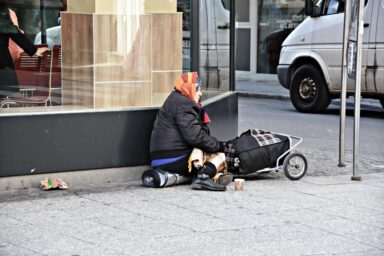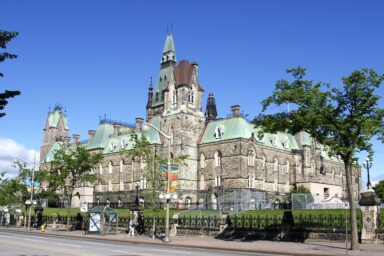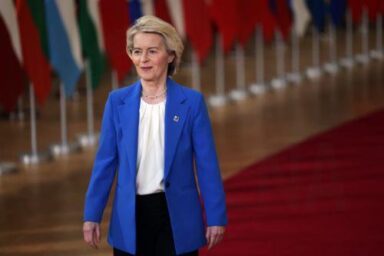Launching Europe’s rearmament plan. Finishing the single market by 2028. Creating high-tech acts for batteries, AI, cloud and quantum. Getting rid of critical raw materials dependence on China; making governments „buy European“; beefing up border patrols. In other words, the European Commission’s plate is going to be quite full next year.
The outcome of Russia’s war will shape Europe’s security order for decades, European Commission President Ursula von der Leyen stressed as she announced the Commission’s 2026 work programme in Strasbourg on Tuesday, 21 October 2025. She cast the plan as a response to an unforgiving world. “Madam President, dear Roberta, honourable Members, our Europe must be an independent Europe,” she told MEPs, tying a historical reference to Simone Veil, the European Parliament‘s first president, to an urgent claim for action.
A packed programme
Ms von der Leyen stressed technological and industrial competition. “We must do more for our own defence and security,” she said. She spoke of jobs, of supply chains and of families—to sell independence the Commission tied strategy to daily life.
She framed the work programme as a practical response. It would concentrate on competitiveness and jobs, on raw materials and critical technologies, on housing and affordability, on migration and the rule of law. She promised deadlines. She promised speed. “Speed is of the essence,” she said, and set 2028 as a political yardstick for unleashing the single market.
Speed is of the essence. — Ursula von der Leyen, European Commission President
Ms von der Leyen offered three arguments. First, she said Europe must finish the single market and cut red tape. Second, she said the Union must reduce dependencies—on supplies and on foreign technology. Third, she insisted on affordability for families and workers. She tied labour policy to industrial renewal. She said industries such as batteries, cloud and AI deserved protection and patronage; and promised to push for “made in Europe” criteria in public procurement.
Unity and defence
The Commission president made defence a top-line priority, saying the defence roadmap to 2030 would set milestones and readiness targets. She insisted procurement must happen together. She broadened the security brief to hybrid threats and climate risks. And she linked migration to democracy, arguing that rules must be enforced and the Pact on Migration and Asylum implemented.
The speech drew immediate responses across the chamber. The centre‑right and pro‑European groups applauded much of the thrust. MEP Jeroen Lenaers (EPP/NED), the only political group representative to speak in the first round who chose to do so in English, said “the EPP welcomes the Commission’s 2026 work programme as an important blueprint for a stronger, more independent and more united European Union, and the emphasis on unity, speed and ambition must guide us in addressing today’s challenges.” He underlined competitiveness, security and migration as the key priorities and urged delivery on the drone defence ideas.
You might be interested
Today we can say clearly that an important part of this Commission work programme bears the social‑democratic stamp. — MEP Iratxe García Pérez (S&D/ESP)
Another EPP voice pushed the same notes (although in German)—arguing that Europe must shift from a rulemaker to an enabler of growth. Markus Ferber (EPP/DEU) urged more boldness on the single market and on simplification—saying Europe should become “an attractive location for entrepreneurs and companies.” Linguistic choices notwithstanding, the insistence from both stems from the same place—a desire to see the Commission act quickly to restore industrial vigour.
Self-congratulatory socialists
The socialists pressed for social content. Iratxe García Pérez (S&D/ESP) insisted that large parts of the programme already bear a social‑democratic imprint. “Today we can say clearly that an important part of this Commission work programme bears the social‑democratic stamp, and it is proof that dialogue, cooperation and commitment among pro‑European forces produce concrete results for citizens,” she said, welcoming affordable housing, anti‑poverty measures and a strengthened social pillar.
There is not love, there is only proofs of love. — MEP Marie Toussaint (Greens-EFA/FRA)
Another Socialist speaker warned that housing must not be a one‑off. Camilla Laureti (S&D/ITA) said housing had become “a true social emergency” and called for a European fund for social housing and a dedicated budget. The socialists accepted competitiveness as necessary, yet insisted that labour standards, child guarantees and social investment must come first.
The Left and Greens demanded binding guarantees on climate and social rights. Marie Toussaint (Greens-EFA/FRA) warned against deregulation and asked for concrete finance for adaptation and a just transition. “There is not love, there is only proofs of love,” she said, calling for action rather than rhetoric.
Social policy and climate
The liberals greeted the document with relief. Valérie Hayer (Renew/FRA) praised consultation and the inclusion of ideas her group had pushed. “this agenda… it is good for Europeans and we support it 1000 per cent,” she declared. Renew and other centrist-minded MEPs urged coherent delivery—especially on the 28th regime and the Savings and Investments Union.
The Greens wanted bolder climate action and clear finance. Sara Matthieu (Greens-EFA/BEL) demanded that the clean industrial deal translate into investment in circular and cleantech markets. Damian Boeselager (Greens-EFA/DEU) framed migration as a competitiveness issue and asked Ms von der Leyen to back a positive labour‑migration plan—pointing to the need for international talent for European competitiveness.
The Left’s Li Andersson (The Left/FIN) reminded the chamber why voters had sent many of them to Brussels — cost of living, inflation and jobs. She welcomed the quality jobs act and asked for limits on subcontracting and rules for AI in the workplace. The Left feared that omnibus simplifications could weaken labour protections.
Bridging divides
Populists and conservative right groups attacked the Commission’s direction. Beata Szydło (ECR/POL) said the speech failed to solve the Union’s pressing industrial problems and accused the Commission of hollowing competitiveness. Her critique echoed across ECR speeches that blamed the Green Deal and Brussels regulation for industrial decline.
(The programme is) schizophrenic and delirious. — MEP Pascale Piera (PfE/FRA)
Christine Anderson (ESN/DEU) made a rather theatrical attack. “It’s me again. I’m sorry. But looking at your work programme, I have to say I haven’t seen a document this full of ridiculous promises since you, Ms von der Leyen, swore to save all of your emails,” she said—lampooning both substance and style. Her group demanded radical rollback of climate and digital rules and called for less EU power.
Nicolas Bay (ECR/FRA) accused the Commission of stifling competitiveness with regulation. Pascale Piera (PfE/FRA) called the programme “schizophrenic and delirious,” warning that omnibus reforms and new centralised initiatives risked overreach and fiscal excess.
Populists, pragmatists, businessmen
Industry and SMEs dominated many interventions. MEPs across the centre urged simplification and harmonisation, arguing that Europe must cut bureaucracy to let businesses breathe. MEPs Billy Kelleher (Renew/IRL) and Morten Løkkegaard (Renew/DNK) pushed the business wallet, the 28th regime and digital facilitation as concrete tools to unlock the single market.
Sceptics feared that simplification could mean deregulation. The Greens and parts of the Left worried that critical social and environmental safeguards might be sacrificed to speed. Ms von der Leyen tried to squeeze both demands into one message: to simplify rules while protecting strategic industries and social rights.
The defence proposals won attention. MEPs from many groups welcomed stronger Europol and Frontex mandates and called for investment in drones and capabilities. The EPP voiced support for an EU drone wall and for rapid capability development. Yet cost questions loomed. Some warned that defence spending and support for Ukraine would place heavy demands on public finances.
Seeking, fearing a 28th regime
Enikő Győri (PfE/HUN) argued that the Commission had undercounted the war’s fiscal burden and urged support for peace initiatives alongside military backing. The tension between a readiness roadmap and social affordability appeared repeatedly; especially from those who feared that defence could crowd out social investment.
The industrial agenda divided opinion. Many MEPs sought deregulation and simplification to help SMEs. Others feared that a 28th regime or citizens’ omnibus could hollow out environmental and labour protections. The Greens and parts of the Left demanded that climate and social goals be non‑negotiable. Ms von der Leyen, again, tried to square the circle, promising both simplification and stronger measures for jobs and climate adaptation.
We want to deliver, not only on the Draghi Report, but on the ‘Draghi plus’. — Maroš Šefčovič, EU Trade Commissioner
Migration proved a flashpoint. Ms von der Leyen stressed the need for legal migration and for enforcement against smugglers. She called for a common returns system and digitalisation of returns and lamented that “80 per cent do not leave” after negative asylum decisions.
Rewiring childhood
Protecting children emerged as a rare area of cross‑party agreement. Ms von der Leyen warned that social media risked “rewiring childhood” and proposed expert panels and possible age limits. The EPP and several centrist groups backed stronger online protections and measures to curb addiction and exploitation. Many MEPs linked online safety to broader questions of democracy and social resilience.
Democracy and rule of law framed many speeches. Ms von der Leyen said Europe must hold to values and defend independent media. Many MEPs tied digital safety and anti‑disinformation measures to broader democratic resilience.
Commissioner Maroš Šefčovič sought to close gaps. He stressed that the work programme followed consultation and that the new framework with Parliament should sharpen delivery. “We want to deliver, not only on the Draghi Report, but on the ‘Draghi plus’,” he said, urging co‑legislators to match political ambition with speed.
A mixed verdict
Several speakers warned that the pro‑European majority must stay coherent. Renew urged the Commission to keep the platform functioning; otherwise major initiatives might stall in Parliament. Delivering the work programme will demand both political will and legislative discipline.
The Strasbourg debate left the Commission’s agenda intact but contested. Ms von der Leyen set a wide table. She promised independence through industry, defence, social measures and greener adaptation. She urged unity and speed and offered deadlines.
I will always be open to finding common solutions. I will always be ready to listen and to engage. — Ursula von der Leyen
MEPs gave a mixed verdict. Some praised coherence and social content. Others feared fiscal strain, deregulation or the hollowing of protections. The chamber produced voices in many languages and many tones; each a ready reminder of the political work to come.
A test of choices
The Commission Work Programme—and the Parliament’s response—shape the EU’s legislative and policy agenda for the year. Committees in the Parliament scrutinise the Commission’s proposals, suggest amendments, and sometimes push for greater ambition (in digital transformation, the Green Deal, or research funding). The resulting resolution (2025/2848(RSP) is Parliament’s channel to influence the EU’s direction, ensuring that the Commission’s plan reflects both the political will of MEPs and the needs of European citizens.
“I will always be open to finding common solutions. I will always be ready to listen and to engage,” Ms von der Leyen said at the end of her speech. The pledge matters. Tuesday has marked a chapter in a negotiation through which the shape of Europe’s independence will be forged—if MEPs can trade slogans for codes, and if the Commission can turn lofty aims into rules that survive the stove of politics.











